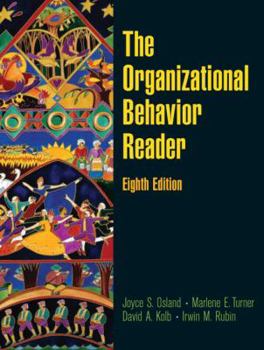The Organizational Behavior Reader
Select Format
Select Condition 
Book Overview
For courses in organizational behaviour, individual behavior in organizations, and industrial psychology. This reader provides the best collection of classic, ground-breaking articles, as well as cutting-edge works in the field in a practical, reader-friendly format to support your experiential OB classroom.
Format:Paperback
Language:English
ISBN:0131441507
ISBN13:9780131441507
Release Date:January 2006
Publisher:Prentice Hall
Length:723 Pages
Weight:2.34 lbs.
Dimensions:1.0" x 7.0" x 9.3"
Customer Reviews
4 ratings
Great Transaction
Published by Thriftbooks.com User , 15 years ago
book arrived quickly and in great condition. would buy from this seller again and would also recommend.
fast delivery
Published by Thriftbooks.com User , 15 years ago
As promised and per the condition advertised in the website. Thank You - will re-buy
Organizational Behavior Reader, 8th ed.
Published by Thriftbooks.com User , 16 years ago
Great addition to the workbook. I was not interested in organization psychology but had to take the class to graduate. I was suprised how much I liked the course and reading the text. Became my favorite course of this semester. Easy to read and very informative.
Well-grounded OB course basics
Published by Thriftbooks.com User , 21 years ago
"The organizational behavior reader" contains twenty chapters, each with two or three readings by recognized academic experts, usually adapted from the original source, e.g., Harvard Business Review. Chapters begin with the psychological contract (1), theories of managing people (2), individual and organizational learning (3), individual and organizational motivation (4), ethics and values (5), personal growth and work stress (6), and later topics include managing diversity (12), leadership (13), decision making (15), performance appraisal (18), and managing change (20). The pantheon of authors features experts such as Henry Mintzberg, Jay Conger, Denise Rousseau, Ed Lawler, Peter Senge, Cary Cooper, Deborah Tannen, Geert Hofstede, Hank Sims, Victor Vroom, Jeffrey Pfeffer, Ray Miles, and Rosabeth Moss Kanter. There are numerous charts, diagrams, graphs and models. Anecdotes and examples are plentiful. Self-assessments are rare. Few of the readings offer empirical data; the emphasis is on mental models, images, and concepts.Professors of organizational behavior, looking for readings rather than integrated text, exercises, and cases, as well as a less expensive alternative to traditional college textbooks, will find this book appealing. These authors are, in general, engaging and highly readable. Chapters can be assigned in an order or avoided altogether to please the teacher's preferences. The breadth of topics, the currency of the treatments, and the expertise of the authors provide a solid foundation for the primary college OB course. Graduate students in need of less text structure and faculty in need of less ancillary materials will find the most benefit.The book is rooted in social psychology and emphasizes perception, learning, thinking, images and personality, e.g., interpersonal communication, attribution, creativity. There is less on the `behavior' side of organizational behavior. Several authors use the device of posing `myths' to contrast with the author's learned, alternative state (`fact'), and sometimes the myths read more like `conventional wisdom' or the author's own attempt to make his or her point more vivid by presenting a myth that exists only in the minds of a few people. For business school students, this reader is more about organizations and people than about business. Business faculty and courses adopting this book will likely want and need to provide a management context.





